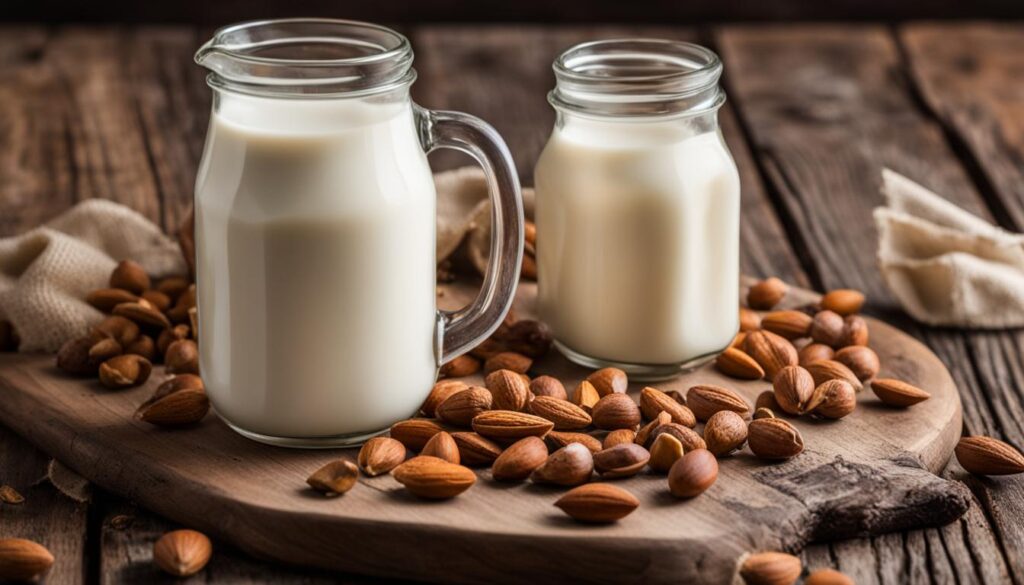Deciding between homemade and store-bought options is a common dilemma, especially when it comes to maintaining a healthy lifestyle. It’s important to make informed choices that align with our goals and values. By exploring DIY healthy alternatives and embracing homemade options, we can upgrade our nutrition and enjoy the satisfaction of creating healthier alternatives in our own kitchens.
Key Takeaways:
- Choosing homemade over store-bought allows for greater control over ingredients and reduces consumption of processed additives and preservatives.
- Homemade meals provide opportunities for family time, cooking, and bonding in the kitchen.
- Consider factors such as availability, cost, time, frequency of use, and personal value when deciding between homemade and store-bought options.
- Making homemade nut milk offers health benefits such as customization, avoidance of additives, and higher nutrition value compared to store-bought options.
- When choosing store-bought nut milk, look for brands with a higher percentage of nuts and avoid those with additives, thickeners, and added sugars.
The Benefits of Homemade
When it comes to maintaining a healthy lifestyle, homemade meals have numerous advantages over store-bought options. By preparing homemade dishes, you have complete control over the ingredients used, allowing you to prioritize your health and well-being. Unlike store-bought meals that often contain processed additives and preservatives, homemade meals are made with a shorter list of wholesome ingredients, ensuring a nutritionally dense and satisfying eating experience.
But it’s not just about the quality of the food. Cooking homemade meals also presents an opportunity for family time, cooking together, and bonding in the kitchen. By involving your loved ones in the cooking process, you not only create lasting memories but also teach valuable culinary skills and pass down treasured family recipes.
What’s more, homemade meals allow you to experiment with healthy substitutes and tailor recipes to your dietary needs. Whether you have certain food allergies, follow a specific diet, or simply want to incorporate more nutritious ingredients, homemade cooking offers limitless possibilities. You can replace unhealthy fats with healthy alternatives, reduce sodium content, and incorporate more fiber-rich ingredients to boost your overall well-being.
“Making homemade meals not only allows you to prioritize your health, but it also brings families together and fosters creativity in the kitchen.”
Benefits of Homemade Meals:
- Control over ingredients
- Reduced consumption of additives and preservatives
- Family time and bonding in the kitchen
- Customizable recipes tailored to dietary needs
- Opportunity for creativity and experimentation with healthy substitutes
If you’re looking for inspiration, here are some popular homemade healthy recipes to try:
- Quinoa-stuffed bell peppers
- Homemade vegetable soup
- Salmon with roasted vegetables
- Rainbow fruit salad
By embracing homemade meals and incorporating healthy substitutes, you can take charge of your health and elevate your culinary experience. So, why not unleash your inner chef and start creating delicious and nutritious homemade dishes today?

Factors to Consider when Choosing Store-Bought
While homemade is generally preferred, there are situations where store-bought may be a good alternative. When deciding between homemade and store-bought options, it’s important to consider the following factors:
- Availability: Is there a good store-bought option for the product you need? Sometimes, certain products are more readily available in stores, especially if they require specialized ingredients or equipment.
- Cost: Analyze the cost difference between store-bought and homemade options. Consider the price of the ingredients needed for homemade versus the price of the pre-packaged product. Additionally, factor in any additional costs associated with making the product at home, such as equipment or utilities.
- Time: Assess the time involved in making or buying the product. If you have a busy schedule or limited time, store-bought options may be more convenient. Homemade alternatives often require preparation, cooking, and cleaning time, while store-bought options offer quick and easy solutions.
- Frequency of Use: Evaluate how frequently you use the product. If it’s something you use frequently, it may be more practical and cost-effective to make it at home. However, for less frequently used items, store-bought options may be more convenient.
- Added Value: Consider the added value the product brings to your life. For some individuals, the satisfaction of making their own food or knowing the exact ingredients used is valuable. Others may prioritize convenience and are satisfied with the quality of store-bought options.
By carefully considering these factors, you can make an informed decision when choosing between homemade and store-bought options. Remember, the choice may vary depending on the specific product and your personal preferences and circumstances.
Homemade vs. Store-Bought Comparison
| Homemade | Store-Bought | |
|---|---|---|
| Taste | ✔️ | ✔️ |
| Control over Ingredients | ✔️ | ❌ |
| Cost | ✔️ | ❌ |
| Time | ❌ | ✔️ |
| Convenience | ❌ | ✔️ |
| Customization | ✔️ | ❌ |
As seen in the table above, homemade options offer greater control over ingredients and customization, but may require more time and effort. Store-bought options, on the other hand, provide convenience and save time, but often lack the ability to tailor the product to your preferences. Ultimately, the choice between homemade and store-bought depends on your individual needs and priorities.

The Health Benefits of Homemade Nut Milk
Making your own nut milk at home offers numerous health benefits compared to store-bought options. When you make nut milk from scratch, you have control over the ingredients, ensuring a high percentage of nuts and maximizing the nutritional value. Homemade nut milk also avoids the additives, thickeners, and added sugars commonly found in store-bought versions, promoting a healthier choice for your diet.
By customizing your homemade nut milk, you can experiment with different flavors and varieties, tailoring it to your taste preferences and dietary needs. Whether you prefer the creamy richness of almond milk or the earthy goodness of cashew milk, homemade nut milk allows you to enjoy the natural flavors and versatility of different nuts.
Additionally, making your own nut milk enables you to avoid low-quality oils that may be present in store-bought options. Instead, you can choose high-quality oils or eliminate them altogether, ensuring you consume only the purest and healthiest ingredients.
“Making homemade nut milk not only guarantees a nutritious and additive-free alternative, but it also empowers you to take control of your health and well-being.”

Comparing Homemade Nut Milk with Store-Bought Options
To emphasize the health benefits of homemade nut milk compared to store-bought alternatives, let’s consider a simple comparison:
| Homemade Nut Milk | Store-Bought Nut Milk | |
|---|---|---|
| Nut Percentage | Higher | Lower |
| Additives and Thickeners | Avoided | Common |
| Added Sugars | Avoided | Common |
| Oil Quality | Controlled | Varies |
| Taste and Versatility | Customizable | Limited |
As the table shows, homemade nut milk surpasses store-bought options in terms of nut percentage, absence of additives and thickeners, and absence of added sugars. It also allows for greater control over oil quality and offers a wider range of taste and versatility.
By opting for homemade nut milk, you’re making a conscious choice to prioritize your health and well-being. The satisfaction of creating your own nutrient-rich and additive-free nut milk is unparalleled, giving you a deeper appreciation for the quality and flavor of homemade alternatives.
Choosing the Best Nut Milk Brand
When it comes to choosing a store-bought nut milk, making the right decision is crucial for your health. To ensure you’re getting the best nut milk available, consider the following factors:
- Higher Percentage of Nuts: Look for brands that prioritize the nut content, opting for a higher percentage of nuts to water. This ensures that you’re getting more nutritional value from the milk.
- Avoid Additives and Sugars: Check the ingredient list carefully and steer clear of brands that add unnecessary additives, thickeners, and sugars. These can undermine the health benefits of nut milk and may not align with your dietary goals.
- Wholesome and Recognizable Ingredients: Opt for nut milk brands that use wholesome, recognizable ingredients. Avoid products that include unfamiliar or heavily processed substances.
- Unsweetened Varieties: For maximum control over the sugar content in your diet, choose unsweetened nut milk. This allows you to add your preferred sweeteners, such as honey or maple syrup, if desired.
- Be Cautious of Low-Quality Oils: Some nut milk brands may use low-quality oils as additives. Read the label carefully to ensure you’re consuming nut milk made with high-quality oils.
By selecting a high-quality nut milk brand that meets these criteria, you can enjoy the convenience of store-bought nut milk without compromising on nutrition. Remember, the quality of the ingredients matters, so choose wisely and savor every sip of your delectable and wholesome nut milk.
The Advantages of Making Your Own Nut Milk
Making your own nut milk has numerous advantages over buying store-bought options. When you make your own nut milk, you have complete control over the ingredients, ensuring that you’re getting the most nutritionally. Homemade nut milk allows you to avoid additives, preservatives, and thickeners that are often present in store-bought versions. By making your own, you can guarantee that you’re drinking pure, wholesome milk.
Not only does homemade nut milk offer better nutrition, but it also tastes superior to store-bought alternatives. You can customize your homemade nut milk with different flavors and varieties, adding a personal touch to every batch. Say goodbye to bland and generic nut milk, and say hello to a world of delicious possibilities.
In addition to the health benefits and improved taste, making your own nut milk is more cost-effective in the long run. While the upfront cost of purchasing nuts may seem higher, it goes a long way. You can make a larger quantity of nut milk for a fraction of the price of store-bought options. Plus, homemade nut milk reduces waste, making it a more sustainable choice for the environment.
Take a look at the table below for a detailed comparison between homemade and store-bought nut milk:
| Homemade Nut Milk | Store-Bought Nut Milk | |
|---|---|---|
| Control over ingredients | ✓ | x |
| Avoidance of additives and preservatives | ✓ | x |
| Taste customization | ✓ | x |
| Cost-effectiveness | ✓ | x |
| Reduced waste | ✓ | x |
As you can see, making your own nut milk offers a range of advantages compared to store-bought options. So why not give it a try? Start enjoying the benefits of homemade nut milk today!

My Homemade Nut Milk Recipe
- Soak your preferred nuts (such as almonds, cashews, or hazelnuts) overnight in water.
- Drain and rinse the soaked nuts.
- Blend the nuts with fresh water in a high-speed blender until smooth.
- Strain the blended mixture through a nut milk bag or a fine mesh strainer to remove any pulp.
- Optional: Add natural sweeteners or flavorings like vanilla extract or cinnamon for enhanced taste.
- Pour the homemade nut milk into a clean glass bottle and store in the refrigerator.
“Making my own nut milk has been a game-changer for me. Not only do I get to ensure the quality of ingredients, but I also love having the freedom to experiment with different flavors. It’s healthier, tastier, and better for the planet!” – Jane Smith
How to Make Homemade Nut Milk
Making homemade nut milk is a simple and rewarding process that allows you to enjoy the benefits of a nutritious and customizable dairy-free milk. By following a few steps, you can create your own delicious homemade nut milk, tailored to your taste preferences and dietary needs.
Gather Your Ingredients and Equipment
Before you start, make sure you have the following:
- Fresh nuts of your choice (such as almonds, cashews, or hazelnuts)
- Filtered water
- A high-speed blender or food processor
- A fine mesh strainer or nut milk bag
- Glass containers for storing the nut milk
Soak the Nuts
Place the nuts in a bowl and cover them with water. Let them soak for the recommended time to soften their texture and enhance the creaminess of the milk. Different nuts may require different soaking times, so be sure to consult a recipe or nut milk guide for specific instructions.
Blend with Water
After soaking, drain the nuts and rinse them thoroughly. Place the nuts in the blender or food processor and add fresh filtered water. The ratio of nuts to water will depend on how creamy you prefer your nut milk. Start with a 1:3 ratio (1 cup of soaked nuts to 3 cups of water) and adjust according to your taste.
Pro Tip: For a rich and creamy nut milk, you can also add a pinch of salt, a sweetener of your choice (such as dates or maple syrup), or flavorings like vanilla extract or cinnamon.
Strain the Mixture
Pour the blended mixture through a fine mesh strainer or nut milk bag into a bowl or pitcher. This will separate the pulp from the liquid, leaving you with smooth, creamy nut milk. Gently press or squeeze the pulp to extract as much milk as possible.
Customize and Store
At this point, you can taste the freshly made nut milk and adjust the flavorings according to your preference. If desired, you can add more sweetener or any additional flavors. Once you’re satisfied with the taste, transfer the nut milk into glass containers with airtight lids and store them in the refrigerator. Homemade nut milk can typically be kept for up to five days, but make sure to give it a good shake before each use as separation may occur.
Making your own nut milk opens up a world of possibilities to explore different flavors and combinations. Experiment with unique nut combinations, such as almond and cashew or hazelnut and macadamia, to create your own signature blend. You can also use the leftover nut pulp in various recipes, such as baked goods or homemade granola, reducing waste and maximizing the nutritional value of the nuts.
Enjoy the satisfaction of crafting your own homemade nut milk, and savor the creamy goodness that comes from DIY healthy meals.
Zero Waste Tips for Homemade Nut Milk
When it comes to homemade nut milk, not only are you making a healthier choice for your body, but you’re also taking a step towards reducing waste. Here are some zero waste tips to help you make the most out of your homemade nut milk:
1. Store leftovers for future use
Instead of letting your homemade nut milk go to waste, store any leftovers in the refrigerator. It can keep well for several days, allowing you to enjoy it throughout the week.
2. Freeze in ice cube trays
If you find yourself with more nut milk than you can consume within a few days, consider freezing it in ice cube trays. This way, you can conveniently portion it out for future use in smoothies, coffee, or other recipes.
3. Repurpose the leftover pulp
After straining your nut milk, you might be left with pulp that can still be used. Instead of discarding it, put it to good use in your baking. The leftover pulp adds texture and flavor to cookies, breads, or even granola bars.
4. Compost the remains
If you’re unable to find a use for the leftover pulp, consider composting it. By composting the remains, you’re turning it into nutrient-rich soil, which can be used for gardening or potted plants.
By implementing these zero waste tips, you’ll not only enjoy the delicious and nutritious benefits of homemade nut milk but also contribute to a more sustainable lifestyle. Let’s reduce waste and embrace the beauty of homemade alternatives.
Conclusion
The choice between homemade and store-bought options ultimately depends on factors such as availability, cost, time, frequency of use, and personal value. But by making informed choices and embracing DIY healthy alternatives, you can experience a nutritious lifestyle upgrade.
Whether it’s homemade meals or homemade nut milk, opting for the do-it-yourself approach brings significant benefits to your overall health. When you make your own food, you have full control over the ingredients, allowing you to avoid unhealthy additives and preservatives commonly found in store-bought options. By incorporating homemade recipes into your daily routine, you can customize your meals according to your specific dietary needs, prioritizing fresh and wholesome ingredients.
Choosing DIY healthy alternatives also offers a sense of empowerment and satisfaction. By taking charge of your own health and well-being, you can truly enjoy the process of creating homemade, healthier alternatives. Homemade meals create opportunities for family bonding and can be a fun and rewarding activity in the kitchen. Similarly, making your own nut milk not only guarantees a higher percentage of nuts but also allows you to explore a variety of flavors and experiment with different nuts, adding excitement and diversity to your diet.
So, why settle for store-bought options when you can elevate your lifestyle with DIY healthy alternatives? Embrace the power of homemade choices and experience the numerous benefits they bring to your well-being. Take the first step today and enjoy the journey of crafting homemade meals and beverages that nourish both your body and soul.
FAQ
What are the benefits of homemade meals?
Homemade meals are generally considered healthier because they allow you to have control over the ingredients used. They are often made with fewer ingredients, reducing the consumption of processed additives and preservatives. Additionally, homemade meals provide an opportunity for family time, cooking, and bonding in the kitchen.
When should I choose store-bought over homemade?
Store-bought may be a good alternative when there is a lack of time, availability of a good store-bought option, or when the cost difference is minimal. Assess the frequency of use and the added value the product brings to your life to make an informed decision.
What are the health benefits of homemade nut milk?
Making your own nut milk allows you to ensure a high percentage of nuts, avoiding additives, thickeners, and added sugars commonly found in store-bought versions. It also provides customization options and the ability to avoid low-quality oils, resulting in a healthier choice.
How do I choose the best store-bought nut milk?
Look for brands with a higher percentage of nuts to water, avoiding those with additives, thickeners, and added sugars. Read the ingredient list carefully and choose unsweetened varieties. Avoid brands that use poor quality oils to enjoy the convenience without sacrificing nutrition.
What are the advantages of making my own nut milk?
Making your own nut milk gives you control over the ingredients and ensures maximum nutritional value. It allows you to avoid additives, preservatives, and thickeners, and guarantees that you’re drinking it in its purest state. Homemade nut milk tastes better, offers customization, is more cost-effective, and reduces waste, making it a sustainable choice.
How do I make homemade nut milk?
Soak nuts for the recommended time, blend with water in a high-speed blender, and strain the liquid using a mesh or nut milk bag. Add flavors if desired and store in glass containers.
What can I do with leftover nut milk pulp?
Instead of discarding the leftover pulp, you can use it in baking, such as cookies or breads, to reduce waste and make the most out of your homemade nut milk.

